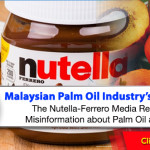Is Palm Oil A Cancer Risk? Let Truthful Science Prevail!
In addition to the Nutella / Palm oil cancer link streamed extensively in the media, there have been accompanying reference associated to a study in Nature (doi:10.1038/nature20791; G. Pascual et al. 2016) that is also cross-quoted by some sources but not all, to support their claims against palm oil.
We opinion the Nature publication as follows:
- The publication by G. Pascual is indeed an important scientific output that allows better understanding of the underlying mechanisms of some human cancer metastasis. This is the process whereby cancer cells spread from the place where they first formed to another part of the body. The cancer cells break away from the original (primary) tumor, travel through the blood or lymph system, and form a new tumor in other organs or tissues of the body.
- Metastasis of some human cancer cells were reported to particularly rely on dietary lipids to promote metastasis.
- A very high fat diet (60% as fat calories) was shown to promote metastasis and information was generated that when palmitic acid, a common dietary fatty acid that occurs throughout nature was tested, it promoted metastasis.
This was highlighted in a PR / media release initiated by Worldwide Cancer Research and was extensively carried and promoted by ScienceDaily (www.sciencedaily.com). Both parties took undue liberty by extrapolating the findings to raise an alert that palmitic acid is a main component of animal and vegetable fats and present in high levels in palm oil which is used in many house hold products. Incidentally, palmitic acid is the major fatty acid that our body makes to sustain life.
Such reference to palmitic acid in palm oil triggered consumers concerns with some concluding that palm oil could be cancer promoting.
Does the Pascual et al. study support this conclusion? We examined the underlying details as follows:
- The study reported a metastasis promoting effect in mice fed a high fat diet containing 60% as fat calories. We then examined the source of this high fat diet. It was a lard-soyabean oil combination fat source in the test diet.
- Lard is a rich source of saturated palmitic and stearic acids, the monounsaturated oleic acid (which is also present in European rapeseed oil, Canadian Canola oil, high oleic varieties of sunflower and soya oils as well as olive oil). The soybean oil in this case provided a source of the polyunsaturated fatty acids.
- The high fat diet tested by the researchers was 37% saturated (contained both palmitic and stearic from the lard source). It also had 47% monounsaturated oleic acid and 16% polyunsaturated fatty acids.
- Any of these fatty acids on their own or in combination could have contributed to the increased metastasis of the cancer cells in the mice model used.
- Interestingly PALM OIL was not a source of fat or fatty acids in the test regime.
The researchers furthered their evaluation by testing saturated palmitic acid. They used a pure, free form of palmitic acid (source unidentified and we therefore conclude not likely from palm oil). They reported that palmitic acid was taken up by the cells and it helped promotion of metastasis of the cancer cells.
Although the researchers did not in any way implicate palm oil, Worldwide Cancer Research and ScienceDaily were quick to unjustifiably associate palm oil with cancer due to its high palmitic acid content.
Why did the researchers themselves not draw this conclusion? We believe that their unbiased scientific assessment prevailed. It is postulated that they were aware that there were limitations to their study interpretations that they recognized. These could be:
- The data on palmitic acid was instrumental in allowing them to correctly draw a conclusion that individual fatty acids were involved in metastasis of the cancer cells.
- However, this also presented the possibility that other commonly occurring fatty acids including oleic, linoleic and linolenic could also exert similar effects
- The above mentioned fatty acids which are regular components of our daily diets, were not tested or elucidated in the study. This is a big gap in the data that surely will be corrected by the scientific community in the future.
- These conclusions thus do not support a role for palm oil and cancer as far as the findings are concerned.
One can only conclude that the conclusions of World Cancer Research and ScienceDaily were unsubstantiated when they associated palmitic acid with palm oil and this helped portray / create a consumer scare about palm oil and cancer.
Reference:
Targeting metastasis-initiating cells through the fatty acid receptor CD36
Gloria Pascual et al., Nature 2016, 541,41–45; doi:10.1038/nature20791
Article Credit:
Dr. Kalyana Sundram
Chief Executive Officer
Malaysian Palm Oil Council (MPOC)
Email:kalyana@mpoc.org.my










Leave a Reply